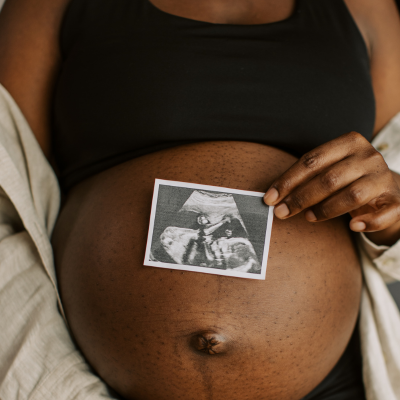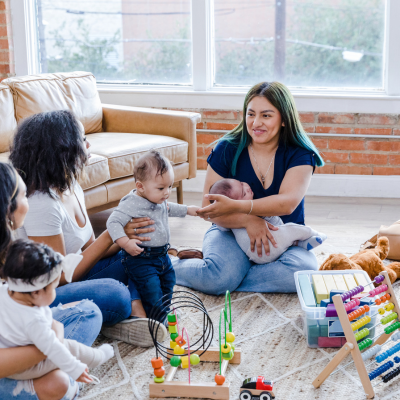The journey to becoming a mom, especially if the fertility process has been difficult, is so often not an easy road and that’s why we need to acknowledge the many emotions, thoughts and fears that may pop up during this time.
Pregnancy after the loss—be it miscarriage, stillbirth or the loss of a child or another loved one —brings on so many different kinds of emotions. Conceiving, or even thinking about it, can cause worry, anxiety, fear, rage, hope… it’s a lot to sit with.
And since miscarriage and loss is (unfortunately) so common, so many women go through this emotional rollercoaster. While unfair, this is something a large percentage of the population will experience. The journey to becoming a parent is so often not a neat and pretty road and that’s why we need to acknowledge the many emotions, thoughts and fears that may pop up at any point along the road from trying to conceive to the weeks after the birth.

Normalizing the messiness of this stage is important as it takes away loneliness, isolation, and feelings of shame. If you’ve experienced loss and are now on the road to becoming a parent (or thinking about it), you’re in the right place.
Here is a guide to emotions you might be feeling and ways to ease your experience and establish proper support systems.
Pregnancy after loss: There’s no “right” or “wrong” way to feel
If you’ve already experienced a miscarriage, stillbirth or death of a child, then you’ve suffered. There’s absolutely no need to add guilt or self-judgment to the list because of any feelings that are popping up right now.
For the person who needs to hear it: there is no right or wrong way to feel as you work through your journey to motherhood. Everyone is different and all thoughts, fears, and emotions are valid.
With that said, here are some common feelings that could come up during this stage. If you recognize yourself in this list, know that yes, it’s normal. All feelings on the spectrum from happy to sad to angry are healthy, human emotions and you have full permission to experience all of them.
Anxious
Pregnancy after loss (or trying to conceive again) can bring up so much anxiety. This is one of the most common feelings for soon-to-be moms. This can look like waiting for the other shoe to drop, stressing over every single symptom, fearing medical appointments, and being anxious that your past experiences with loss will repeat themselves. Many also have anxiety over sharing the news or doing normal everyday tasks because you don’t want to risk anything.
Angry
It’s normal to feel angry that this is happening to you. You may be mad that you don’t get to experience a “normal” pregnancy or that you worry each month as you try to get pregnant. You may also feel mad or upset that society doesn’t discuss experiences like yours out in the open. This can sound like, “Why didn’t anyone tell me?” or “How come I didn’t know about this?”
Jealous
Jealousy can be a hard emotion to sit with. You don’t want to feel jealous of those who already have kids or who got pregnant easily without the grief that you had to deal with. But, it’s natural to feel that way anyway. Oftentimes jealousy after pregnancy loss can look like feeling happy for friends and family AND wishing you had that for yourself at the same time.
Skeptical
Conceiving after loss can bring out someone’s cynical or mistrustful side. That makes sense. If you’re identifying with this one, it’s because you may have caught yourself wondering if this pregnancy will work out and you’ve questioned whether or not you’ll give birth to a happy healthy baby in the near future.
Relieved
Getting the news that you’re pregnant after loss can bring on a sense of relief. Going through the process of trying to conceive after an experience like loss or miscarriage can be quite emotionally turbulent so you may feel like you can finally breathe knowing that you’re onto the next chapter now.
Detached
Many women say that they feel detached from a pregnancy or they feel less excited during the entire journey towards becoming a mom. This shows up as women not feeling connected to their baby during pregnancy or immediately after, not truly *feeling* like they’re pregnant, or not feeling much emotion once they get that positive test. Yes it’s normal. You’re not alone.
How to bring ease to your experience
It doesn’t have to be this hard. While pregnancy after loss (or trying again after loss) is something that is inherently hard, there are so many ways to bring ease back into your experience.
Here’s some ways to create support and stability during this phase.
Find a friend who “gets it.”
Having a sympathetic ear who is there to listen without problem-solving or giving unsolicited advice makes all the difference. Don’t suffer in silence. Feeling heard, seen and validated makes the experience so much less isolating. You’re allowed to take up space.
Seek out a community of other women who have been there.
Things like miscarriage, loss, still birth and fertility problems are not rare. So many people have been where you are. There’s a massive community around the unfair experiences that happen when we try to build our families. Find the groups, read the books, search out the online communities who will support you.
Get support from a perinatal mental health therapist.
Having someone who will walk with you on this journey and give you professional guidance will make things easier on a day-to-day basis. Your friends and family might not always say the right thing, but someone trained in perinatal mental health will have the perspective to make sure you’re actually supported in the way you need to be. The Perinatal Collective has therapists all over Canada for this kind of thing.
Make self-soothing practices like walking in nature, reading, and breaks from technology part of your every day.
Put yourself first during this time. Coming back after a loss this significant is draining to say the least. You need to fill your own cup so that you can be a strong, perseverant version of you. What would that look like? Daily practices running, reading, walking in a forest, or cooking without distracting notifications can provide an important emotional boost.
Audio journal.
Sometimes saying it out loud helps you process and heal. No need to re-listen if you don’t want to. Nothing is off limits, just hit record and say everything out loud. Putting words to your experience and articulating emotions can help you get to the root of anxiety or understand your personal experience better.
Pregnancy after loss is so common and it’s also one of the most difficult experiences a woman can ever go through. It’s no wonder that the journey to becoming a parent can bring on so many mixed emotions and spikes in anxiety. The things to know here are that you’re not alone, everything is treatable, and there’s no right or wrong way to feel. Give back to yourself in any way that you can and know that help is available.








Comments +